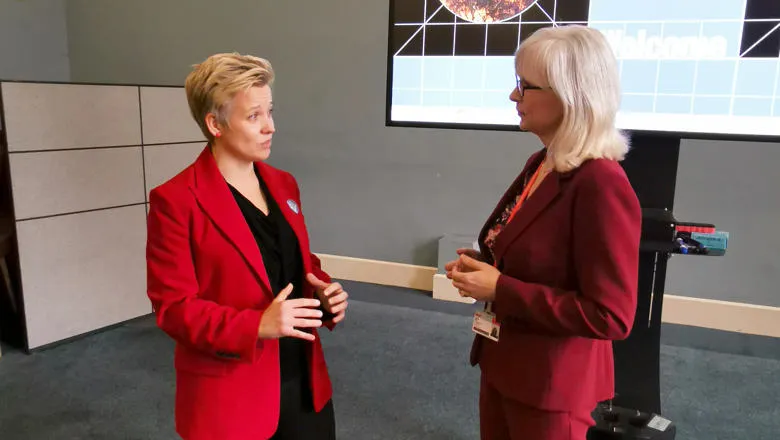
Professor Katie Bailey
Emerita Professor of Work and Employment
Research interests
- Human Resource Management
Biography
Katie Bailey is an Emerita Professor of Work and Employment and former Head of the HRM & Employment Relations group at King's Business School. Her research focuses on meaning and purpose at work, temporality and interstitial times and spaces in organisations, employee engagement, and strategic human resource management.
Areas of expertise:
- Human resource management
- Meaningful work
- Organisational purpose
- Employee and work engagement
- Temporality
Katie has published numerous articles in journals such as the Harvard Business Review, Sloan Management Review, Academy of Management Perspectives, Journal of Management Studies, Human Relations, Human Resource Management, Human Resource Management Journal, International Journal of Human Resource Management, European Journal of Work and Organizational Psychology, and Work, Employment and Society.
She is the lead author of the textbook Strategic Human Resource Management (2nd Ed, OUP, 2018), co-editor of The Oxford Handbook of Meaningful Work (OUP, 2019), and lead editor of Employee Engagement in Theory and Practice(Routledge, 2014). Currently, she is co-editing the book The Purpose-Led Organisation in Times of Climate Crisis, due to be published by Routledge in 2025. She has held editorial board roles at several leading scholarly journals includingHuman Resource Management and Work, Employment and Society; she was Associate Editor at Human Resource Management Journal and Co-Editor-in-Chief of the International Journal of Management Reviews.
Her research has been widely cited in the media in outlets such as the Times, Financial Times, Management Today, Telegraph, Times Higher, People Management, Harvard Business School Publications, the World Economic Forum, Radio 5 Live, and Radio 2 and she has participated as an expert speaker in numerous blogs and webinars.
Katie has won a number of international awards including the 2021 5-year Scholarly Impact Award from Human Resource Management Review, the 2020 Elwood F Holton III Research Excellence Award, and the 2019 Richard Beckhard Memorial Prize from the MIT Sloan Management Review. Her research has been supported by major grants from the ESRC, NIHR, CIPD, BA/Leverhulme Trust, and industry.
Katie is a Fellow of the Academy of Social Sciences and Higher Education Academy, an Academic Fellow at the CIPD, and an Honorary Fellow at the Institute for Employment Studies. She was a Trustee of the Involvement and Participation Association, a member of the CIPD Research Ethics committee, and has been a member of a number of government and ESRC panels. She was also the Chief External Examiner at London Business School. In 2020, she was on a working group of academics responsible for reporting to BEIS on the future of work, and from 2021-2024 she was a member of the Renewing Work Advisory Group of Experts (ReWAGE) working with the government in support of the recovery and renewal of work and employment in the UK post-Covid 19. She has been on the senior leadership team at four business schools.
Katie works extensively with employers and organisations interested in engagement, purpose, and meaning, and is much in demand as a conference and workshop speaker on these topics. Previous clients have included: the European Parliament, the CIPD, the Ministry of Defence, Universities HR, Global Success Partnership, the People Director Partnership, MSL, Jelf, Pfizer, NHS Employers, Engineering Employers’ Federation, Grass Roots, and the Employee Engagement Summit.
Katie has held posts at the Universities of Sussex and Kent and Kingston University, as well as at London Business School, where she completed her PhD. In addition to her academic roles, Katie is a qualified Member of the Association for Coaching and works as a coach, specialising in supporting academics to develop their careers. She is a lay member of the ACCA Qualifications Board and has a mentoring role at Northumbria University.
Are you currently accepting new PhD students?
No
News
New book sets out a practical roadmap for purpose-led organisations facing the climate crisis
The Purpose-Driven Organisation in Times of Climate Crisis brings together climate science and management research to help leaders embed purpose and...

How does having a sense of purpose enhance performance?
Olympic performance psychologist Kate Goodger and Professor Katie Bailey discuss meaning and purpose at work

Professor Katie Bailey wins prize from MIT Sloan Management Review
Paper addresses the challenges of building an ethically strong organisation

Events

Book launch: The Purpose-Driven Organisation in Times of Climate Crisis
Join us for this exciting book launch, along with a discussion about organisational purpose with leading practitioners
Please note: this event has passed.

Meaning and Purpose Network: The purpose-driven organisation: challenges, controversies and solutions
Creating more ethical, inclusive and sustainable futures for organisations through partnership and knowledge sharing
Please note: this event has passed.

Meaning and Purpose Network: Why Purpose Matters in the Return from Lockdown
In this latest webinar from the King’s Business School Meaning and Purpose Network, we explore why organisational purpose is more important than ever as we...
Please note: this event has passed.
Features
Alumni Voices: work can be made meaningful
Katie Bailey is Professor of Work and Employment at King's Business School.

News
New book sets out a practical roadmap for purpose-led organisations facing the climate crisis
The Purpose-Driven Organisation in Times of Climate Crisis brings together climate science and management research to help leaders embed purpose and...

How does having a sense of purpose enhance performance?
Olympic performance psychologist Kate Goodger and Professor Katie Bailey discuss meaning and purpose at work

Professor Katie Bailey wins prize from MIT Sloan Management Review
Paper addresses the challenges of building an ethically strong organisation

Events

Book launch: The Purpose-Driven Organisation in Times of Climate Crisis
Join us for this exciting book launch, along with a discussion about organisational purpose with leading practitioners
Please note: this event has passed.

Meaning and Purpose Network: The purpose-driven organisation: challenges, controversies and solutions
Creating more ethical, inclusive and sustainable futures for organisations through partnership and knowledge sharing
Please note: this event has passed.

Meaning and Purpose Network: Why Purpose Matters in the Return from Lockdown
In this latest webinar from the King’s Business School Meaning and Purpose Network, we explore why organisational purpose is more important than ever as we...
Please note: this event has passed.
Features
Alumni Voices: work can be made meaningful
Katie Bailey is Professor of Work and Employment at King's Business School.

